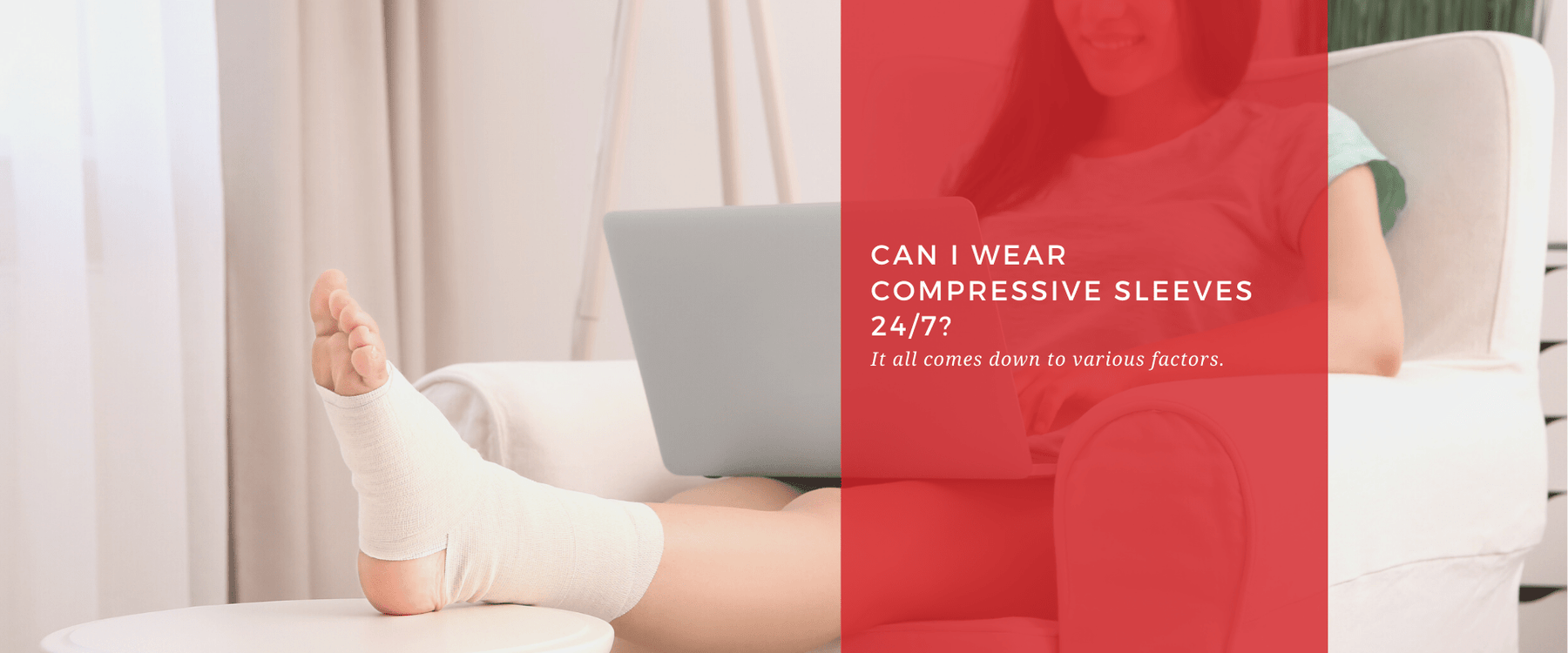With over 1 million orders

Can I Wear Compressive Sleeves 24/7?
Whether you're a seasoned athlete, someone dealing with chronic pain like arthritis, or simply looking for ways to improve blood circulation, compression sleeves have probably crossed your radar and you've asked yourself: can I wear compressive sleeves 24/7?

These snug-fitting sleeves are gaining traction as versatile tools that aid muscle recovery and offer targeted support.Here’s our advice: it basically comes down to the fit of the sleeve… but there are critical things to remember.
For starters, yes compression sleeves are meant to provide a level of pressure on the affected area, but it shouldn’t be tight enough that it becomes uncomfortable.
The Science Behind Compression Sleeves
Before diving into the specifics of wearing these sleeves, it’s essential to understand the science behind them. Compression sleeves work by applying a balanced pressure across the affected area, promoting blood circulation. Improved circulation can mitigate soreness and relieve pain, making these sleeves not just a sports accessory but a medical aid as well.
When to Wear Them: Daily Use vs. Extended Periods
A commonly asked question is, "Is it okay to wear a compression sleeve all day?" The answer is nuanced and largely depends on how well the sleeve fits.

Three Checks for the Perfect Fit
- Appropriate Compression: The sleeve should deliver a balanced level of pressure on the affected area without causing discomfort.
- Indentation Checks: If the sleeve leaves heavy, uncomfortable indentations on the edges, it's too tight.
- Mobility: A well-fitted sleeve will allow you to move your limbs comfortably, maintaining a balance between compression and flexibility.
If you check all these boxes, you're on the right track.
How Long Can You Wear a Compression Sleeve?
For those who've found the right fit, extended wear throughout the day can be beneficial, especially when you’re on the move. The graduated compression works best during periods of activity, helping to alleviate discomfort and improve your ability to move freely.
Can I Wear Compressive Sleeves 24/7: Yay or Nay?
Wearing a compression sleeve to bed is a topic that deserves its own discussion. The gravitational pull that affects blood circulation when you're upright is not a concern when you're lying down. Thus, it's best to consult your physician to evaluate whether you need overnight compression.
Shopper’s Guide: The Importance of Brand Trustworthiness
Remember, not all compression sleeves are created equal. Opt for a trusted brand with a reputation for quality and customer service. After all, your health and comfort are on the line.
What Dr. Arthritis Has To Offer
We offer a range of sleeves and braces designed for a variety of chronic issues, including arthritis. Each purchase also comes with a comprehensive handbook filled with exercises to maintain joint health.
SHOP NOW
Frequently Asked Questions
1. Can I wear a compression sleeve while exercising?
Yes, many athletes and fitness enthusiasts wear compression sleeves during exercise to improve blood circulation and reduce muscle fatigue. However, it's essential to choose a sleeve designed specifically for athletic activity for the best results.
2. Do compression sleeves help with lymphedema?
Compression sleeves can be beneficial for managing symptoms of lymphedema by promoting fluid drainage and reducing swelling. However, consult with a healthcare provider for a personalized treatment plan.
3. Is it possible to wear compression sleeves on both arms or legs simultaneously?
Yes, you can wear compression sleeves on both limbs if needed, as long as they are the right size and you're comfortable. Some people find it helpful to wear sleeves on both sides to maintain balance, especially during physical activity.
4. Can I wear a compression sleeve under clothing?
Absolutely. Compression sleeves are designed to be slim and fit snugly, so they can easily be worn under clothing. Many people wear them under their regular attire for day-long support.
5. What material should I look for when buying a compression sleeve?
Materials like nylon, spandex, and elastane are commonly used in the construction of compression sleeves. These fabrics offer a balance of comfort, breathability, and effective compression.
6. How do I properly care for and clean my compression sleeve?
Generally, hand washing in cold water with mild detergent and air-drying is the best way to care for your compression sleeve. Avoid using hot water, bleach, or a dryer, as these can break down the fabric and reduce the sleeve's effectiveness.
7. Can I use a compression sleeve after surgery?
Compression sleeves are often recommended post-surgery to help reduce swelling and improve blood circulation, aiding in faster recovery. However, it's crucial to consult your surgeon or healthcare provider for specific recommendations.
8. Can children use compression sleeves?
While compression sleeves can be beneficial for all ages, it's essential to consult a pediatrician before using them on children, especially for medical reasons. The pediatrician can provide guidance on the appropriate size and usage.
9. How often should I replace my compression sleeve?
The lifespan of a compression sleeve depends on the frequency of use and the material's quality. Generally, a sleeve should be replaced every 3-6 months if worn regularly, or when you notice a decrease in compression.
10. Can I use compression sleeves if I have a skin condition?
If you have a skin condition, consult your healthcare provider before using a compression sleeve. Some conditions may be aggravated by the material or the pressure exerted by the sleeve.
These additional FAQs should provide a more comprehensive overview for those interested in using compression sleeves.
For more information on how to maximize the benefits of compression sleeves, take a look at the articles below:
